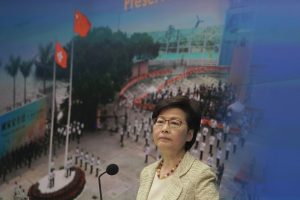As Carrie Lam Cheng Yuet-ngor prepares to leave office on June 30, 2022, as the Hong Kong Special Administrative Region’s fourth chief executive, Hong Kong is left with an overwhelming sense of loss. Lam came into office in 2017 with the community’s high hopes that she could put an end to the bitter divisive politics that split society under her predecessor, Leung Chun-ying, and move Hong Kong forward. In the end, she disappointed big time.
Lam’s legacy is built on the back of a failed extradition bill that she pushed at all costs. In 2019, it triggered six months of increasingly violent, riotous anti-government protests that she was unable to manage. The authorities in Beijing acted. They imposed a new national security law (NSL) on June 30, 2020 and made fundamental changes to Hong Kong’s electoral system in the spring of 2021. Authorities used these tools and others (such as colonial-era sedition and public order laws) to remake Hong Kong.
The end result is that, as Lam’s five-year term draws to a close, Hong Kong has lost a substantial amount of its autonomy, sharply restricted the scope for citizen participation in government, and eroded both government accountability and capacity. Taken together, this has caused serious reputational damage to Hong Kong. Apparently, however, leaders in Beijing and Hong Kong were willing to pay the steep price to remake Hong Kong’s government into one that is more centralized – and more easily controlled.
Under Lam’s administration, Hong Kong lost significant autonomy to manage its political institutions, civil service, education, and the media. Using the NSL, authorities purged (arrested, jailed, and chased out) the pan-democratic opposition from the Legislative Council (LegCo) and Hong Kong’s 18 District Councils. Using a new election law, which empowered authorities to vet all candidates, officials re-constituted the expanded Election Committee and the LegCo with officially identified “patriots.” The Election Committee supplies 40 of the LegCo’s 90 members and endorses the Chinese Communist Party’s (CCP) selection to become chief executive.
On May 8, 2022, the 1,500 members of the Election Committee voted for a single nominee, John Lee Ka-chiu. The voter support for Lee was 99 percent compared to 66 percent for his predecessor, Carrie Lam. For a broader comparison, Election Committee support for the three chief executives prior to Lam – C.Y. Leung, Donald Tsang, and C.H. Tung – was 61 percent, 82 percent, and 80 percent, respectively. In essence, the Election Committee lost the autonomy to consider other candidates, an outcome the CCP heralded as “democracy with Hong Kong characteristics.”

































